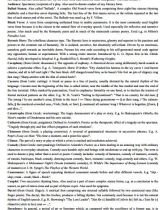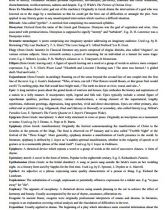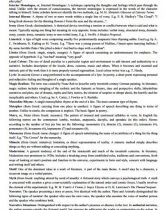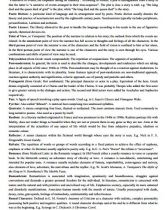Hledej
Zobraz:
Univerzity
Kategorie
Rozšířené vyhledávání
12 663
projektů
Literární termíny z Angličtiny
| Přípona |
Typ tahák |
Stažené 21 x |
| Velikost 0,2 MB |
Jazyk anglický |
ID projektu 2615 |
| Poslední úprava 17.12.2013 |
Zobrazeno 1 554 x |
Autor: keepcup |
 Sdílej na Facebooku
Sdílej na Facebooku |
||
| Detaily projektu | ||
- Cena:
0 Kreditů - kvalita:
74,7% -
Stáhni
- Přidej na srovnání
- Univerzita:-
- Fakulta:-
- Kategorie:Jazyky » Angličtina
- Předmět:Úvod do literatury
- Studijní obor:Katedra anglistiky a amerikanistiky
- Ročník:-
- Formát:PDF dokument (.pdf)
- Rozsah A4:9 stran
Absurd, the: Subcategory of the comic. Includes equal rates of the comic and the tragic. E.g. absurd drama.
Accentual Verse: A type of verse measured by the number of accents in each line. Most English poetry is accentualsyllabic, i.e. its rhythm arises from the number and alternation of its stressed and unstressed syllables as organized into
feet. Accentual verse is used e.g. in Beowulf.
Affective Fallacy: A confusion between a work of art and its results, i.e. what it is and what it does". Evaluating a work
of art in terms of "its results in the mind of the audience" is supposed to be a critical error. Applies both to prose and
poetry.
Alexandrine: In French prosody a tetrametre line of twelve syllables. In English verse the equivalent is the iambic
hexametre. Alexandrine is not common in English verse because of its length. E. Spenser used it for the last line of his
Spenserian stanza in The Faerie Queene. Also used by R. Bridges in The Testament of Beauty. Also used in A. Pope's
Essay on Criticism: "A needles Alexandrine ends the song, / Thát, líke | à wóund|èd snáke,| drágs ìts | slów léngth
àlóng".
Allegory (from Greek: speaking otherwise): A story in verse or prose with a double meaning, a primary surface
meaning and a secondary under-the-surface meaning. It can be read, understood and interpreted at two or more levels.
E.g. E. Spenser's Faerie Queene, N. Hawthorne's The Marble Faunor G. Orwell's Animal Farm.
Alliteration(from Latin: repeating and playing upon the same letter): A figure of speech which repeats consonants at
the beginning of words or stressed syllables. The device is older than rhyme and is commonly used. E.g. S. T.
Coleridge's "Kubla Khan": "Five miles meandering with a mazy motion".
Anagnorisis (from Greek: recognition): Defined in Aristotle's Poetics as the moment of recognition of truth when
ignorance gives way to knowledge. According to Aristotle, the ideal moment of anagnorisis coincides with peripeteia,
or reversal of fortune. E.g. In Sophocles's Oedipus Rex when Oedipus discovers he has himself killed Laius.
Anaphora(from Greek: carrying up or back): A rhetorical device which repeats a word or a group of words at the
beginning of successive clauses. Common in many literary forms. E.g.: G. Chaucer's Troilus and Criseyde: "Swich fyn
hath, lo, this Triolus for love! / Swich fyn hath al his grete worthynesse! / Swich fyn hath his estat real above, / Swich
fyn his lust, swich fyn hath his noblesse"!
Anapaest(from Greek: beaten back): A metrical foot comprising two unstressed syllables followed by one stressed.
The opposite of a dactyl. The anapaest, like the iamb, produces a rising rhythm. A running and galloping foot used to
create the illusion of swiftness and action. E.g. T. S. Coleridge's "Metrical Feet":"Wìth à leáp | ànd à boúnd | thè swìft
Á | nàpaèsts thróng".
Antagonist: The character opposing the hero or protagonist in drama or fiction. E.g. in W. Shakespeare's Othello, Iago
is antagonist to the Moor.
Anti-hero: A non-hero. The antithesis of a dashing, brave and resourceful hero. The anti-hero is given the vocation of
failure, he is incompetent, unlucky, clumsy and stupid. E.g. Tristam in L. Sterne's Tristam Standy, Jim Dixon in K.
Amis's Lucky Jimor Jimmy Porter in J. Osborne's play Look Back in Anger.
Apollonian: Derived from the name of the Greek god Apollo. Apollo was the messenger of the gods and the presiding
deity of music, medicine, youth and light. Sometimes identified with the sun. Apollonian is supposed to signify "sunny"
and "serene".
Accentual Verse: A type of verse measured by the number of accents in each line. Most English poetry is accentualsyllabic, i.e. its rhythm arises from the number and alternation of its stressed and unstressed syllables as organized into
feet. Accentual verse is used e.g. in Beowulf.
Affective Fallacy: A confusion between a work of art and its results, i.e. what it is and what it does". Evaluating a work
of art in terms of "its results in the mind of the audience" is supposed to be a critical error. Applies both to prose and
poetry.
Alexandrine: In French prosody a tetrametre line of twelve syllables. In English verse the equivalent is the iambic
hexametre. Alexandrine is not common in English verse because of its length. E. Spenser used it for the last line of his
Spenserian stanza in The Faerie Queene. Also used by R. Bridges in The Testament of Beauty. Also used in A. Pope's
Essay on Criticism: "A needles Alexandrine ends the song, / Thát, líke | à wóund|èd snáke,| drágs ìts | slów léngth
àlóng".
Allegory (from Greek: speaking otherwise): A story in verse or prose with a double meaning, a primary surface
meaning and a secondary under-the-surface meaning. It can be read, understood and interpreted at two or more levels.
E.g. E. Spenser's Faerie Queene, N. Hawthorne's The Marble Faunor G. Orwell's Animal Farm.
Alliteration(from Latin: repeating and playing upon the same letter): A figure of speech which repeats consonants at
the beginning of words or stressed syllables. The device is older than rhyme and is commonly used. E.g. S. T.
Coleridge's "Kubla Khan": "Five miles meandering with a mazy motion".
Anagnorisis (from Greek: recognition): Defined in Aristotle's Poetics as the moment of recognition of truth when
ignorance gives way to knowledge. According to Aristotle, the ideal moment of anagnorisis coincides with peripeteia,
or reversal of fortune. E.g. In Sophocles's Oedipus Rex when Oedipus discovers he has himself killed Laius.
Anaphora(from Greek: carrying up or back): A rhetorical device which repeats a word or a group of words at the
beginning of successive clauses. Common in many literary forms. E.g.: G. Chaucer's Troilus and Criseyde: "Swich fyn
hath, lo, this Triolus for love! / Swich fyn hath al his grete worthynesse! / Swich fyn hath his estat real above, / Swich
fyn his lust, swich fyn hath his noblesse"!
Anapaest(from Greek: beaten back): A metrical foot comprising two unstressed syllables followed by one stressed.
The opposite of a dactyl. The anapaest, like the iamb, produces a rising rhythm. A running and galloping foot used to
create the illusion of swiftness and action. E.g. T. S. Coleridge's "Metrical Feet":"Wìth à leáp | ànd à boúnd | thè swìft
Á | nàpaèsts thróng".
Antagonist: The character opposing the hero or protagonist in drama or fiction. E.g. in W. Shakespeare's Othello, Iago
is antagonist to the Moor.
Anti-hero: A non-hero. The antithesis of a dashing, brave and resourceful hero. The anti-hero is given the vocation of
failure, he is incompetent, unlucky, clumsy and stupid. E.g. Tristam in L. Sterne's Tristam Standy, Jim Dixon in K.
Amis's Lucky Jimor Jimmy Porter in J. Osborne's play Look Back in Anger.
Apollonian: Derived from the name of the Greek god Apollo. Apollo was the messenger of the gods and the presiding
deity of music, medicine, youth and light. Sometimes identified with the sun. Apollonian is supposed to signify "sunny"
and "serene".
Klíčová slova:
Absurd
Antagonist
Anaphora
Alliteration
Allegory
Obsah:
- Alexandrine
Alliteration
Byronic Hero
Cacophony
Chiasmus
Deux Es Machina
Epigram
Epiphany
Euphony
Grotesque
Pastoral
Oxymoron
Realism
Refrain
Septet
Sonnet
Theme



